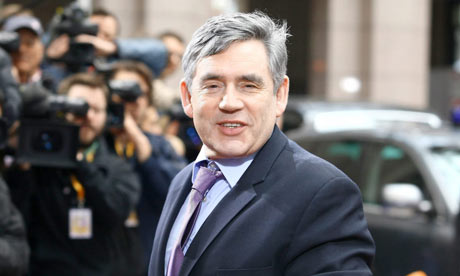MPs will get 18-day window to form government under emergency plan drawn up by Whitehall Whitehall sources say Brown could remain prime minister and try to create a working majority even if the Tories were to win most seats. Photograph: Julien Warnand/EPA The likelihood of a hung parliament has prompted Whitehall to draw up contingency plans that would give Gordon Brown extra time to form a viable administration if there is no clear winner at the general election. Under the proposals, which have been drawn up to prevent a constitutional crisis and a run on the pound, parliament may not reconvene for nearly three weeks to allow the prime minister to form a working government with the minority parties. Normally, MPs would sit again in six days. Senior Whitehall sources stressed tonight that Brown could remain prime minister and try to create a working majority even if the Tories were to win most seats. It has also been agreed that for the first time the civil service will be able to facilitate talks between Labour or the Tories and the minority parties on forming a coalition. The civil service will not be allowed to provide policy advice, but will be able to draw up papers on potential policy overlap between the parties. The Queen may also have to play a role in the event of a hung parliament; under existing rules, she could urge the political parties not hold a second poll if it is not deemed to be in the national economic interest, or there is little sign that it will produce a different result. A run of polls have suggested Britain is heading for a hung parliament, and the civil service, Buckingham Palace and political parties are anxious to codify the rules and conventions surrounding a hung parliament to prevent confusion. The head of the civil service, Sir Gus O'Donnell, updated a manual today which sets out how the key players are expected to act if no party can instantly form a government. In one of a number of precautionary steps, it has been agreed that parliament should not meet to decide if a government can be formed for as long as 18 days after polling day. The extension to the period is to give the political parties extra leeway to create a government commanding the support of the Commons. After the 18 days the Tories could then table an immediate motion of no confidence. The manual is designed to protect the Queen from being asked prematurely to invite someone to form a government, or to prevent a constitutional impasse causing a panic in the financial markets at a time when the UK's triple-A credit rating is under threat . O'Donnell is due to meet with other senior civil servants in New Zealand shortly to discuss how they have handled hung parliaments. It also emerged todaythat it is possible that the chancellor, Alistair Darling, could even remain in his post – in charge of policy on sterling – pending the formation of the government, even in the event that he has lost his parliamentary seat. That scenario would arise because Brown would remain as prime minister, and therefore responsible for all ministerial appointments, until it were clear that he was unable to secure a majority for his Queen's speech. Senior Whitehall sources were keen to stress that it would be Brown's duty to remain in place until it were clear that a successor exists who was capable of securing a majority for their own speech. The Queen will not intervene in any discussions between the political parties, the sources made clear, although she can expect to be kept informed of developments. It is for the political parties to agree on a prime minister who can win support for the speech. Although conventions remain unclear, it will be open for the Queen to reject a call for a dissolution of parliament if it is not in the national interest. But this was unlikely, the sources said. It is likely that she will take into account the length of time since the previous election and how unlikely it is that no agreement can be reached in the Commons on the identity of a new prime minister. The prime minister will not be expected to make policy announcements during this caretaker period, but instead focus on trying to form a government. In the discussions on the formation of a minority government or coalition, civil service sources said it will also be the duty of the civil service to facilitate the talks by providing a venue. The civil service staff would remain outside the room during any inter-party talks, but may be asked to draw up any formal agreement between them. The cabinet would not meet after the election unless a Queen's speech had been voted through. O'Donnell has been talking to the political parties, the justice select committee and constitutional lawyers, such as Peter Hennessy, Vernon Bogdanor and Robert Hazell, to draw up and clarify the manual on how to proceed should the general election be inconclusive.Gordon Brown likely to stay as PM in hung parliament

Tuesday, 30 March 2010
Posted by
Britannia Radio
at
23:19
![]()





















